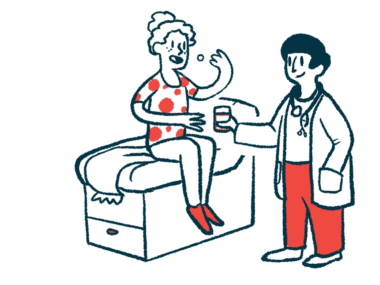How I’m Processing Grief With Myasthenia Gravis
Regrets after a death in the family make a columnist angry at her disease
Written by |

Today I despise myasthenia gravis. I resent the eight years I had to fight for a diagnosis. I’m jealous of my able-bodied family members. But most of all, I loathe having myasthenia gravis.
Some say there are seven stages of grief while other say there are five. Regardless of the number of stages, anger is in both. Why am I angry, and why am I grieving?
My great-grandmother passed away last week at the ripe old age of 104. She lived an amazing life and was ready for the next part of her journey. The last time I’d seen her was in my preteen years, when I’d spent summers in Montana with her and my grandmother (also deceased). Great-Grandma was the last of my grandparents.
And I didn’t have the opportunity to see her before she left this earth. She never met my husband. She did get to meet my son, her great-great-grandson. For this, I’m thankful.
There have been dozens of missed opportunities to see her over the last 15 years — family reunions and gatherings that I missed out on because of my Army service or my health.
I’ve always lived far away from my family; we’re spread out over the United States and Canada. My husband and I have been working to get me to go see her, but my health didn’t cooperate. Most days I don’t mind having family all over the place. Today is not most days.
My health hasn’t been stable enough to make the 15-hour drive to where she was living and be able to enjoy the visit. When we moved from Maine to Wisconsin in April, we drove halfway across the country, and it took me weeks to recover. My husband and I wanted to make the trip and not have it set me back.
I was hopeful that I’d be able to see her when the family celebrated her 105th birthday since my health has been on an upward trajectory and is becoming more stable with each intravenous immunoglobulin treatment. The evening of Sept. 6, those hopes were dashed. I got a call from my dad I wasn’t expecting. The hope for making the trip is now remorse for not going sooner.
After I got off the phone with my dad, I cried. A lot. Which led to difficulty breathing, necessitating the use of my BiPAP. One of the symptoms I experience is diaphragm and accessory (breathing) muscle weakness. One of the activities that triggers this weakness is crying. Through the years, I’ve learned how to control emotional outbursts as a result.
I’m unable to have a big, heavy, sobbing cry, the kind that leaves your nose full of snot, gives you a headache, and makes your face red and puffy. Doing so leads to severe symptom exacerbations. I’ve learned to allow the tears to fall silently and to harness those strong emotions. This may save my physical health, but it’s admittedly a detriment to my emotional and mental health.
It takes me longer to get through the stages of grief since I can allow myself to feel only in small, controlled bursts. I tend to stay in the anger stage longer — angry at what has been taken and what I can no longer do. I skip the bargaining stage and will sit with depression for a while.
Just when I think I’ve hit the acceptance stage, I cycle back around to anger. I bounce between processing grief, anger, and acceptance for a while before I finally settle on acceptance. I know this is how I must process grief for any event, which sets me apart from many of my peers.
Knowing this, however, doesn’t make it easier. Sometimes it makes it more difficult.
So today, I am angry.
But tomorrow is a new day and another opportunity to focus on living my best life — improving my quality of life one step, one wheel roll, one breath at a time.
Note: Myasthenia Gravis News is strictly a news and information website about the disease. It does not provide medical advice, diagnosis or treatment. This content is not intended to be a substitute for professional medical advice, diagnosis, or treatment. Always seek the advice of your physician or other qualified health provider with any questions you may have regarding a medical condition. Never disregard professional medical advice or delay in seeking it because of something you have read on this website. The opinions expressed in this column are not those of Myasthenia Gravis News or its parent company, Bionews, and are intended to spark discussion about issues pertaining to myasthenia gravis.




Leave a comment
Fill in the required fields to post. Your email address will not be published.